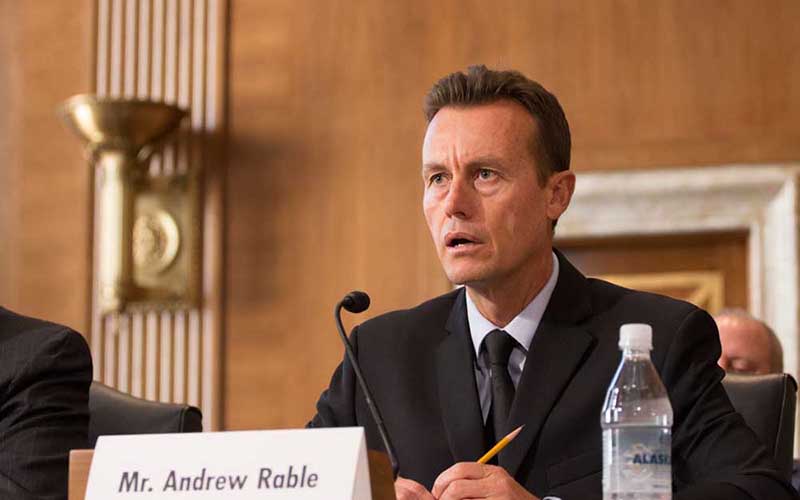
Andrew Rable, the manager of forestry and special programs for APS, told a Senate panel that utilities support bills that would streamline the process for getting access to power lines on federal lands so they can maintain the lines. (Photo by Isaac Windes/Cronkite News)
WASHINGTON – When overgrown forests clash with energy infrastructure – devastating fire and power outages can follow.
But current law puts up bureaucratic hurdles that make it hard for utilities to do the forest clearing that could prevent those fires, and then holds them responsible when fires break out, an Arizona Public Service official told a Senate committee Tuesday.
That’s why Andrew Rable, the manager of forestry and special programs for APS, said the utility and the Edison Electric Institute were supporting bills – one House measure and one Senate bill – that would streamline the process for getting right-of-way access while shielding utilities from fire liability under some circumstances.
“Electric companies must have timely access to both public and private lands on which power line ROWs (rights of way) are located, to perform necessary vegetation management … thus reducing risk to electric company facilities and the lands on which they are located,” Rable said in testimony prepared for the Senate Energy and Natural Resources Committee hearing.
Critics agreed that overgrown power rights of way present a problem. But Brett Hartl, director of government affairs at the Center for Biological Diversity, said the bills may go too far, allowing expedited approval of projects could lead to poor management and in turn “spread invasive species and fragment wildlife habitat.”
At issue is a bill that passed the House in June and a section – Section 2310 – of a larger Senate bill. There are slight differences between the two versions, but both aim to make it easier for utilities to get access to power lines for “vegetation maintenance” and both provide a level of protection if fires break out in areas the utilities could not readily access.
-Cronkite News video by Bailey Vogt
Rable said management can include spraying herbicides, putting in plants that prevent less fire risk or trimming the plants that are already there. He said fire danger grows without proper management and can cause “wildfires, lead to cascading power outages and jeopardize the physical integrity of energy infrastructure.”
Mark Hayden, general manager of the Missoula, Montana, Electric Cooperative, cited the case of a New Mexico cooperative that faced a $38.2 million bill for damages from a 152,012-acre fire that began when “just one aspen tree fell onto the power line in the co-op’s Forest Service right of way.”
“This is why I believe federal reforms are needed to cut red tape and make it easier to manage vegetation to limit downed power lines, prevent catastrophic fires and respond to emergencies,” Hayden said in his prepared testimony.
But Scott Miller, senior regional director for the Southwest Region of the Wilderness Society, shared Hartl’s concerns about the language in the bills, which he fears it too broad.
He pointed to the “inherent ambiguity” of the term “adjacent rights of way” in the Senate bill, for example, and to language that would relieve electric companies of liability “for wildfire damage, loss or injury, including the cost of fire suppression.”
Miller said that could potentially leave “the agencies and ultimately, taxpayers, to cover the damages caused by the utilities’ negligence.”
But Hartl said liability was nuanced, and that that there is “validity to both sides of the argument,” given that power lines are needed.
Both Hartl and Miller agreed – with all the witnesses at the hearing – that there needs to be cooperation between federal land management agencies and utilities, something Miller said is lacking in the House bill.
Collaboration “should be the touchstone for any legislation to advance reliability, wildfire protection and public land management in the context of utility vegetation management,” Miller said. The bill “fails to provide the necessary cooperation that will improve effective and sustainable … management on federal lands.”